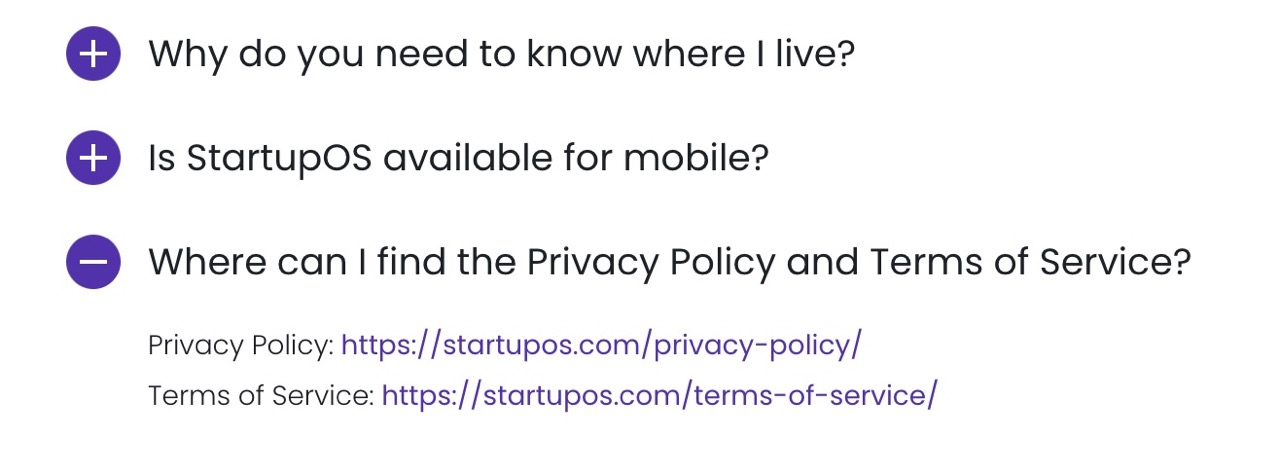Running a startup can be a chaotic time; a million things need to be built, done, tracked, analyzed, considered, reported and validated. Keeping an overview of it all can be hard, and there’s always a threat of something (maybe something important?!) slipping through the cracks. StartupOS today launched a platform to bring some sanity to it all in a bid to help founders stay on track.
The platform was built in partnership with (and backed by) SVB, the parent company of Silicon Valley Bank. It includes access to business tools, guidance, mentors and investors, with the hope that the founders can learn how to best shepherd their startups through the process of validating ideas, building MVPs and finding product-market fit.
The company is headed up by CEO and co-founder Paul Pluschkell, who spent the past quarter century building startups, and has a handful of successful exits under his belt, including MXNet, IXnet, Spigit, Global Center and Kandy.
“One of the primary reasons startups are successful is because they were empowered from the beginning of their journey with access to the tools, sources of funding, and network needed to support the growth of their company,” shares Pluschkell in a statement to TechCrunch. “Unfortunately, however, not every founder has the same level of empowerment and support due to their background and or geographic location. Through StartupOS, we aim to change that.”
Early next year, the company is adding the ability to connect to a network of investors, turning the StartupOS into a source of early-stage dealflow to interested angels and investors.
StartupOS’s stated mission is that it “aims to dramatically increase the overall number of startups and their probability of success for new, diverse generations of founders.” Which sounds good. As a middle-aged dude with 20+ years of work experience, however, I feel qualified to level this sliver of criticism: It feels a bit rich to have “diverse founders” as a stated goal when the press info features three middle-aged dudes — Mr. Pluschkell (CEO), Mr. Wagner (head of biz dev) and Mr. Dhillon (COO) — with 20+ years of work experience. Adding a woman or some fresher blood to the team might have been a nice touch. When I challenged the StartupOS team on its male-heavy top of the org chart, the company didn’t quite agree.
“We do have a diverse leadership team. In fact, approximately 50% of the top execs at StartupOS are diverse, including women and minorities. Our platform was set up so that startups that would traditionally not have an opportunity for mentorships/investments through accelerators can now have a more direct path to success,” said Pluschkell. “This will be a major advantage for minority-owned businesses that have previously struggled to secure the funding that they need to grow. We are proud of the diversity in our leadership team, and we will continue to hire the best talent, regardless of race, religion, gender and creed.”
The company’s LinkedIn shows that the company has one woman in a leadership position, who is listed on LinkedIn as the company’s content designer. The company’s PR company claims she was recently promoted to the Director of Customer Success.

Curiously, none of the press materials nor the site itself says anything about what the platform is considering as its business model, which made me a little suspicious — from the screenshots, it looks as if the platform is gathering a lot of very valuable data about the various startups, and the old adage is true: If you’re not paying for the product, you are the product. Digging a little deeper, the team shed a bit of light on the road map:
“We have a multi-tiered business model that focuses on the demand side. Startups are free on our platform,” explains Pluschkell. “We will offer a subscription-based service that offers opportunity providers (VCs, accelerators, educational institutions, corporations, etc.) a dashboard to StartupOS companies or enrolled portfolios to view, filter, create watchlists, and connect with Startups on our Platform. We have a Sponsorship & Referral Model that allows for ads on our site for companies that service Startups and can provide services at a discount.”
The company also has a “PowerUP Builder” that enables companies to create PowerUPs (tools that provide learn-by-doing exercises) that work within our platform and create initial awareness by offering a lightweight version of their enterprise tools for startups. The idea is that this is lead gen, in the hope that the startups will subscribe to enterprise services once they raise funds and continue their growth trajectory.
“Later next year we plan to offer a Data Subscription that is aggregated and anonymized data about certain sectors, geographies, business models, and stages of a company lifecycle,” says Pluschkell. “For example, a corporate client in financial services with a StartupOS data subscription can access median revenue growth, cash burn, etc. of pre-Series A financial services startups.”

I wanted to dig a little deeper and discovered that the site’s privacy policy and terms and conditions aren’t where you’d expect to find them. Instead they were buried at the very bottom of the FAQ. In any case, the T&C’s highlighted that all content (“all information, data, and other content, in any form or medium, that is collected, downloaded, or otherwise received, directly or indirectly, from you […] by or through our Service”) you upload to the site can be shared with other site users in perpetuity, and “You further grant (…) an irrevocable, perpetual, transferable, sublicensable (through multiple tiers), fully paid, royalty-free, and worldwide right and license to use, copy, store, modify, distribute and display Your Content.”
Given how much startup info can be proprietary, I’d probably think twice as to whether I’d want to hand over a bunch of my startup’s information to StartupOS.
I find myself wondering if, given the incredible breadth of startups and the needs of various founders, StartupOS is able to be as broadly useful as it is setting out to be. SaaS companies can often play by a similar playbook, but hardware companies or companies operating in regulated spaces (fintech, medtech, etc.) often have a lot of variety in terms of what the “long pole in the tent” represents. It’ll be interesting to see whether the platform is able to attract startups, and whether it’s able to help them in a way that ends up being efficient.
In any case, StartupOS is one to keep an eye on as it scoops up its first few startups and starts proving its thesis.































Comment